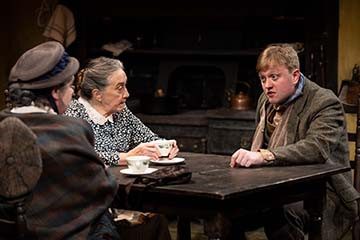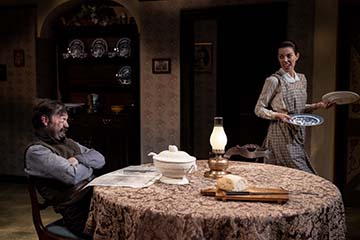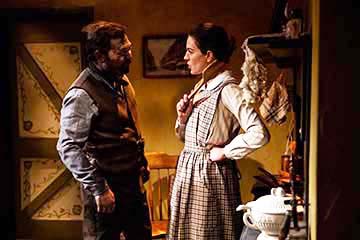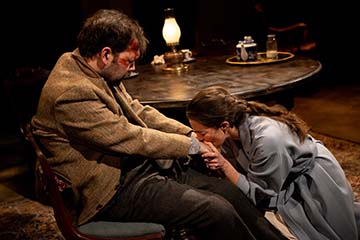By Lucy Komisar
D.H. Lawrence’s 1913 “The Daughter-in-Law” is a classical misogynist play. The tired message is that to have a happy marriage, a woman must be subservient to her husband. This holds even if he’s below her in intelligence and ambition and disinclined to better himself by work. She should move herself down a peg. And mothers are controlling harridans who spoil their sons’ lives if they can.
The fine Mint Theater Company production is directed by Martin Platt with an excellent cast, especially the wife Minnie (Amy Blackman), who shifts between self-assured and self-abnegating, and her mother-in-law Mrs. Gascoyne (Sandra Shipley, always tough).
Minnie and Luther (Tom Coiner, alternately moody and raging) have been married for six weeks. He had asked her twice, though it seems in a fairly desultory fashion, and she said no. Then a year or two later she invited him to Manchester where she was a governess and said they should marry. Her uncle had died and left her 100 pounds, a big sum for the working class.
Lawrence sets her up as a shrew, always finding fault with Luther, even flirting with his brother Joe (Ciaran Bowling).
Early on we learn that Luther, who is 30, made pregnant a sweet not-too-bright neighbor of 23, quite the opposite of the clever Minnie.

The young woman’s mother Mrs. Purdy (Polly McKie), comes to see Mrs. Gascoyne, who out of spite wants to tell Minnie, but Joe, who is there because he lives at home, doesn’t want Luther’s marriage destroyed.
The mothers solve the problem. They will keep everything quiet if Luther pays some money to the Purdy family, who are poor.
There’s also a coming strike by workers in the coal mine. Sometimes you hear the sound of pick axes smashing into the coal. The family rooms and sounds make a realistic set. (Set by Bill Clarke, music and sound by Lindsay Jones.) But although it’s clear that the bosses are rotten, that is just background to the real story, which is Minnie vs Luther, or women against men.
You wonder how Minnie chose him till she admits, “because I could get nobody better.”
She has fitted their living room with a damask covered table and a hutch with blue Wedgwood plates.

He arrives with his face covered in coal dust, which he doesn’t wash off. He slurps his soup.
Minnie presses Luther to work harder to get a promotion. He doesn’t care. The way the words are spoken and directed, she seems to be always pestering and rebuking him. Luther: “Nothing but faults she finds with me…She’s nice with everybody but me.”
Joe visits, breaks one of her fine plates, then another. “That’s for your pretension,” he seems to say. But the aggression may cover up his own anti-female hostility from a sense of being trapped. He will reveal he can’t break away from mother.
Later, drunk, Luther blurts out the pregnancy, figuring Minnie must know. To his credit (as Lawrence portrays it) he is devastated and remorseful. But thinks he might have been better marrying her. “I want somebody to look after me.” So now we have it. Minnie has failed to be the wife as compliant servant.
Lawrence’s theme is the unmanning of men when women are superior to them in some way.
The two seem to break up. She will go to Manchester and take a step she hopes will improve the marriage, because it will make her dependent on him as her husband. Then the sexes will be in proper balance and the marriage can succeed. The tactic is absurd, but she does it faute de mieux, as she had said. From that moment, the play falls into male supremacist fantasy.
Maybe Lawrence had second thoughts, or at least he gives the women their due. Near the end, Mrs. Gascoyne tells Minnie, “when a woman builds her life on men, either husband or sons, she builds on summat as sooner or later brings the house down crash on her head.”
“The Daughter-in-Law.” Written by D.H. Lawrence. Directed by Martin Platt. Stage II, New York City Center, 131 West 55th Street, NYC. MintTheater. Tkts NYCityCenter. (212) 581-1212. Runtime 2:20. Opened Feb 22, 2022, closes March 20, 2022, Video trailer. Review also on NY Theatre-Wire.



